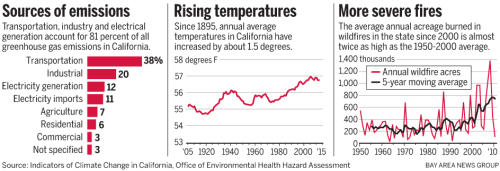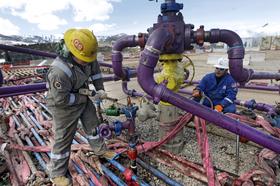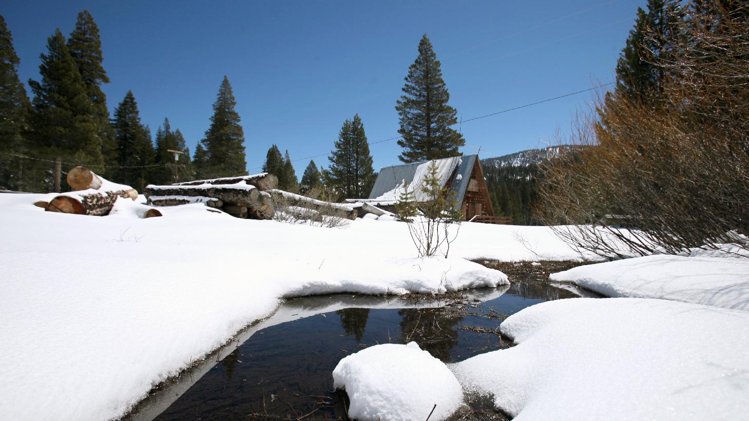| |
Global warming already having dramatic impacts in California, new report says
By Paul Rogers
progers@mercurynews.com
Posted: 08/08/2013 12:01:00 AM PDT | Updated: about 3 hours ago
Rising ocean waters. Bigger and more frequent forest fires. More brutally hot summer days.
These aren't the usual predictions about global warming based on computer forecasts. They're changes already happening in California, according to a detailed new report issued Thursday by the California Environmental Protection Agency.
Climate change is "an immediate and growing threat" affecting the state's water supplies, farm industry, forests, wildlife and public health, the report says. The 258-page document was written by 51 scientists from the University of California, Scripps Institution of Oceanography, Lawrence Berkeley National Laboratory, U.S. Geological Survey and the National Oceanic and Atmospheric

Since 1895, annual average temperatures in California have increased about 1.5 degrees Fahrenheit and continue to rise, the report found. (Aric Crabb, Bay Area News Group)
Administration, among other agencies and institutions.
"Climate change is not just some abstract scientific debate," said California EPA Secretary Matt Rodriquez. "It's real, and it's already here."
Most Californians seem to agree. In a poll last month by the nonpartisan Public Policy Institute of California, 63 percent of the state's residents said the effects of global warming are already being felt, while 22 percent said they will happen in the future. Eleven percent said they will never happen.
Although California has done more than nearly every other state to reduce emissions of heat-trapping gases, the report found, if it were a country, it would still rank as the 13th largest source of greenhouse gases in the world, ahead of France, Brazil, Australia and Saudi Arabia.
What the public may not realize, experts say, is how extensive the impact of climate change already is.
Since 1950, the report found, the three worst forest fire years in California -- measured by acres burned -- all have occurred in the past decade: 2003, 2007 and 2008. And the average number of acres scorched every year since 2000 is almost double the average of the previous 50 years -- 598,000 acres annually now, compared with 264,000 acres a year then.
"A report like this is Paul Revere. It provides an early warning, an early indicator of the challenges we face," said Matthew Kahn, a UCLA economics professor.
Kahn said that just as in past eras when Americans rose to meet threats, entrepreneurs in California will see opportunities to help reduce the impacts of climate change while making money, through industries such as electric vehicles, wind turbines, ocean desalination projects, better air conditioning systems and denser housing in coastal areas, which will remain cooler than inland areas as both warm in the decades to come.
"It's not like the Titanic where we just collide with the iceberg," Kahn said. "Most people want their children and

grandchildren to have a great quality of life. We are going to get future Amazons, Apples and Facebooks out of this that will address the challenges."
But while opportunities may be going up, so are mercury readings.
Since 1895, annual average temperatures in California have increased about 1.5 degrees Fahrenheit and continue to rise, the report found. The length and severity of summer heat waves are increasing.
The sea level at the Golden Gate, home to the oldest continually operating tidal gauge in North America, rose 8 inches over the past century as the world's glaciers and ice sheets have begun melting. Higher seas increase the risk of floods during storms in low-lying communities around San Francisco Bay, from Treasure Island to Alviso.
At Lake Tahoe, there are now 30 fewer days a year compared with a century ago when air temperatures average below freezing, the report found. And while 52 percent of the precipitation at the lake fell as snow in 1910, today only 34 percent does.
"Most Californians get it," said Kathryn Phillips, executive director of Sierra Club California. "The thing I find so frustrating is how bought in elected officials are to the belief they can't do the right thing because it will disturb oil companies and some of the most powerful interests in the state."
Among other changes, Phillips said, the state needs more incentives for solar and renewable energy and mandatory rules requiring more energy-efficient buildings.
In 2006, then-Gov. Arnold Schwarzenegger signed a landmark law, AB32, requiring California to reduce its greenhouse gas emissions to 1990 levels by 2020, a drop of about 25 percent.
So far, however, emissions are up 3 percent since 1990, although they have dipped in the past five years because of the Great Recession and increased use of high-mileage cars as well as solar and wind power.
When it comes to the state's water supply, there's some good news: There is no clear trend in the amount of precipitation over the past 100 years, the report found. So California isn't getting less rain.
But the Sierra Nevada's glaciers have, depending on their location, shrunk from 22 percent to 69 percent over the past century. And spring runoff to the Sacramento River has decreased by 9 percent. That's because more precipitation is falling as rain rather than snow during California's warmer winters, the report found. And less runoff means less water for farms and cities.
Rodriquez said the amount of warming in the coming decades can be limited if the state, nation and world do more to reduce emissions and transition away from fossil fuels.
"We're doing what we can in California to address climate change," he said. "It's our hope that we can avoid some of the more extreme effects."
Paul Rogers covers environmental issues and resources. Contact him at 408-920-5045. Follow him at Twitter.com/PaulRogersSJMN.

The latest on California politics and government
July 31, 2013
Poll finds Californians back climate change fight, skeptical on fracking
 An overwhelming majority of Californians believe the state should act to curtail greenhouse gas emissions, according to a new poll, while residents narrowly oppose hydraulic fracturing and support construction of the Keystone XL pipeline. An overwhelming majority of Californians believe the state should act to curtail greenhouse gas emissions, according to a new poll, while residents narrowly oppose hydraulic fracturing and support construction of the Keystone XL pipeline.
Climate change represents a concrete threat for a majority of Californians, according to the new Public Policy Institute of California poll. More than three-fourths of respondents -- 77 percent -- called climate change a "very serious" or "somewhat serious" threat to the economy and their way of life, while more than half reported being "very concerned" about the threat of global warming fueling more severe wildfires.
Nearly two-thirds of residents and 59 percent of likely voters surveyed want the government to act now to limit climate change -- whose effects are already evident, according to 65 percent of respondents -- rather than wait for the economy to mend.
The level of support for policies to curb climate change affirms the principal behind California's carbon-auction market, which began functioning in November and had raised more than $200 million through mid-June. Sixty-seven percent of adults supported the law creating the market, including 49 percent of Republicans (the bill was signed into law by Republican Gov. Arnold Schwarzenegger).
Still, Californians are generally uninformed about the steps their state government has taken to dampen emissions, with 54 percent saying they had heard "nothing at all" about California's cap-and-trade program.
Majorities of Republican, Democratic and independent adults also backed policies to require more energy-efficient buildings and appliances; to alter land use and transportation policies so people would be less reliant on driving; and to limit emissions issuing from power plants, oil refineries and industrial plants.
On two divisive issues at the intersection of energy and the environment, Californians were less certain.
A partisan fissure ran through public perceptions of hydraulic fracturing, or "fracking," an energy extraction process that multiple California lawmakers have sought to regulate this session. The poll found that 51 percent of California adults surveyed oppose the drilling method, which involves blasting a mix of sand, water and chemicals deep underground.
Within that 51 percent, 60 percent of Democrats and 48 percent of independents opposed fracking, and 49 percent of Republicans who support it.
The proposed Keystone XL pipeline, a vigorously disputed project that would transport oil from Canada to refineries in Texas, narrowly won the support of a majority of Californians (51 percent). Just 38 percent of Democrats backed the project, but 70 percent of Republicans and 57 percent of independents affirmed it.
Gov. Jerry Brown got lower marks for his environmental record than for his performance overall. 48 percent of Californians approve of the job he's doing as governor -- including a resounding majority of Democrats -- but just 39 percent approve of his environmental record, including a slimmer 55 percent of Democrats.
The Legislature's approval ratings mirror its numbers on the environment. 36 percent of Californians and 33 percent of likely voters like the job the Legislature is doing in general; on the environment, those numbers inch up to 38 percent and 34 percent.
PHOTO: In this March 29, 2013 file photo, workers tend to a well head during a hydraulic fracturing operation at an Encana Oil & Gas (USA) Inc. gas well outside Rifle, in western Colorado. Associated Press/Brennan Linsley
Read more here: http://blogs.sacbee.com/capitolalertlatest/2013/07/californians-back-reducing-emissions-fighting-climate-change-poll.html#storylink=cpy
Report: Climate change is impacting California

.
FILE-This April 30,2010 file photo shows a stream seen running through snow covered banks near the site of the Department of Water Resources snow survey at Echo Summit, Calif. A new report released Thursday Aug. 7,2013 found climate change is affecting California. Over the past century, snowpack runoff has decreased due to warmer winters and earlier arrival of spring. (AP Photo/Rich Pedroncelli,File)

ALICIA CHANG 11 hours ago NatureEnvironmentCaliforniaClimate changeSouthern California
LOS ANGELES (AP) — Coastal waters off California are getting more acidic. Fall-run chinook salmon populations to the Sacramento River are on the decline. Conifer forests on the lower slopes of the Sierra Nevada have moved to higher elevations over the past half century.
That's just a snapshot of how climate change is affecting California's natural resources, a report released Thursday found.
"There's certainly reason for concern," said Dan Cayan, a climate scientist at the Scripps Institution of Oceanography who contributed to the report.
The findings are an update to a 2009 report that documented how a warming California is impacting the environment, wildlife and people.
Among the known impacts: Butterflies in the Central Valley are emerging from hiding earlier in the spring. Glaciers in the Sierra Nevada have shrunk. Spring runoff from snowmelt has declined, affecting Central Valley farmers and hydroelectric plants that rely on snowmelt to produce power.
The latest 258-page report, which cost $282,000 to produce, was compiled from existing climate studies and released by an arm of the California Environmental Protection Agency.
Officials hope it would spur the state and local governments to plan ahead and adapt to a hotter future.
Monitoring should continue "to reduce the impacts of climate change and to prepare for those effects that we cannot avoid," George Alexeeff, head of the state Office of Environmental Health Hazard Assessment, said in an email.
Annual average temperatures across the state have risen by about 1.5 degrees Fahrenheit since 1895, with the greatest warming seen in portions of the Central Valley and Southern California.
Levels of carbon dioxide, methane and other heat-trapping gases in the state increased between 1990 and 2011. In recent years, there has been a slight drop — the result of industries and vehicles becoming more energy efficient, the report said.
Some of the carbon dioxide in the atmosphere is being absorbed by the ocean, altering its chemistry. Scientists have documented changes to waters at Monterey Bay, which have turned more acidic in recent years, raising concerns about impact to marine life.
Ocean warming, among other factors, may be behind the dramatic drop of chinook salmon in Central California since 2004. And certain plant and animals species — such as conifers in the Sierra Nevada and small mammals in Yosemite National Park — have responded to a changing climate by moving to higher ground.
Expect more heat waves, wildfires and higher sea levels as the state warms, the report said.
The report "vastly overstates the impacts of greenhouse gases," said University of Alabama at Huntsville atmospheric sciences professor John Christy, who holds a minority view among climate scientists.
Carnegie Institution ecologist Chris Field, an acknowledged leader in the field of climate impacts, said the observations in the report "are more or less the gold standard of where we are now today" and provide a peek of the future.
Follow Alicia Chang at: http://twitter.com/SciWriAlicia
Want to receive TOM BUTT E-FORUM and other action alerts on Richmond political and community issues delivered to your email address? Email your name and email address and/or the names and email addresses of others who would like to be placed on the mailing list and the message "subscribe" to tom.butt@intres.com. Comments, arguments and corrections are welcome. Tom Butt is a member of the Richmond City Council when opinions and views expressed, without other attribution, in TOM BUTT E-FORUM, they are those of Tom Butt and do not reflect official views or positions of the City of Richmond or the Richmond City Council unless otherwise noted. Visit the Tom Butt website for additional information about Tom Butt's activities on the Richmond City Council: http://www.tombutt.com. Phone 510/236-7435 or 510/237-2084. Subscription to this service is at the personal discretion of the recipient and may be terminated by responding with “unsubscribe.” It may take a few days to remove addresses from the distribution list.
This site may contain copyrighted material the use of which has not always been specifically authorized by the copyright owner. We are making such material available in our efforts to advance understanding of environmental, political, human rights, economic, democracy, scientific, and social justice issues, etc. We believe this constitutes a 'fair use' of any such copyrighted material as provided for in section 107 of the US Copyright Law. In accordance with Title 17 U.S.C. Section 107, the material on this site is distributed without profit to those who have expressed a prior interest in receiving the included information for research and educational purposes. For more information go to: http://www.law.cornell.edu/uscode/17/107.shtml. If you wish to use copyrighted material from this site for purposes of your own that go beyond 'fair use', you must obtain permission from the copyright owner.
To the extent that content is excerpted under the fair use doctrine from other media, I urge readers to subscribe to the print versions of these media to help support professional journalism and the businesses that publish news, and I urge readers to log in to the online versions to access additional content, related content and unrelated news. I especially appreciate local sources of news that include the Contra Costa Times , the San Francisco Chronicle, Richmond Confidential and the East Bay Express.
|
|

